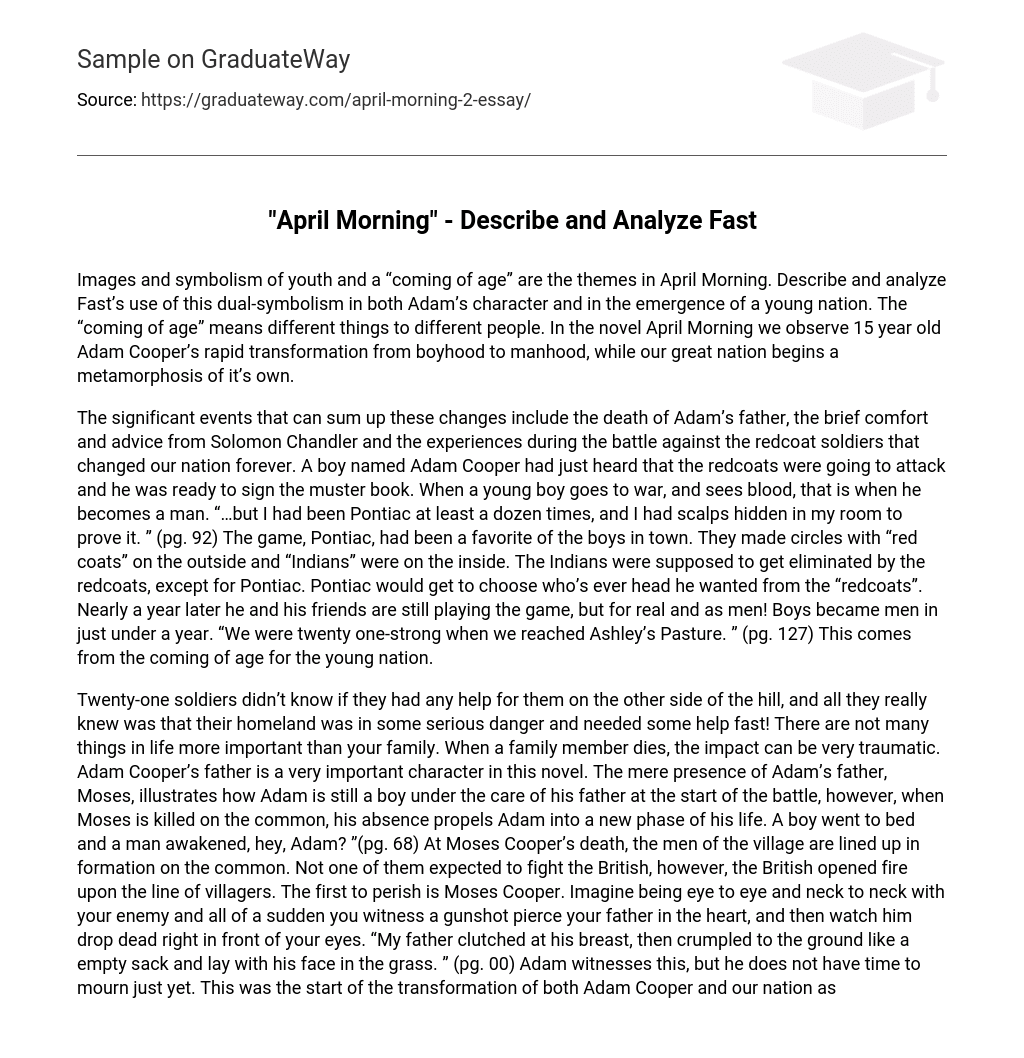The themes explored in April Morning are images and symbolism of youth and a “coming of age”. Fast effectively uses this dual-symbolism in both Adam’s character and in the emergence of a young nation. The concept of “coming of age” holds various meanings for different individuals. In the novel April Morning, we witness the quick transition from boyhood to manhood in 15-year-old Adam Cooper, while simultaneously observing the transformation of our great nation.
The text describes the significant events that marked major changes in the nation. These events include the death of Adam’s father, the advice and comfort from Solomon Chandler, and the experiences during the battle against redcoat soldiers. Adam Cooper, a young boy, learned about the impending attack by the redcoats and was eager to participate in the war effort by signing the muster book. It is said that when a boy witnesses bloodshed in war, he transitions into manhood. The mention of Pontiac as a game reflects how the boys in town used to play it, with redcoats on the outside and Indians on the inside, aiming to eliminate the Indians except for Pontiac. However, almost a year later, Adam and his friends find themselves playing this game for real, truly becoming men. When they finally reach Ashley’s Pasture, they are twenty-one strong, symbolizing the coming-of-age of the young nation.
Twenty-one soldiers were unsure if they had any assistance on the other side of the hill. Their understanding was limited to the fact that their homeland was in grave danger and urgently needed help. Family holds utmost importance in life, with the loss of a family member causing profound trauma. In this novel, Adam Cooper’s father, Moses, plays a significant role. Moses’ mere presence portrays Adam as still a boy under his father’s care prior to the battle. However, Moses’ demise propels Adam into a new phase of life. As Adam’s father dies on the common, he transitions from a boy to a man, as remarked by someone, “A boy went to bed and a man awakened, hey, Adam?” (pg.68). At Moses Cooper’s death, villagers form a line on the common without expecting to engage with the British. Nevertheless, the British initiate fire at the villagers’ line, resulting in Moses Cooper being the first casualty. Imagine being face to face with your enemy, witnessing a gunshot strike your father’s heart, and seeing him fall lifeless right before your eyes. Adam witnesses this devastating scene, but he does not have the luxury to mourn just yet. This moment marks the beginning of Adam Cooper’s transformation and our nation’s transformation as well. Solomon Chandler also plays a critical role in Adam’s development after his ordeal at the common.Solomon’s composed demeanor and wise advice served as a source of comfort for Adam following his father’s passing. Encouraging emotional release, Solomon assures Adam that such reactions are natural. Moreover, he imparts the importance of deeply honoring his fears, especially the Redcoat soldiers, explaining that confronting them directly is key to overcoming them.
During their time walking through the countryside, Solomon fulfills multiple roles for Adam. He serves as a source of emotional support, acting as a shoulder for Adam to lean on. Additionally, Solomon acts as a temporary substitute for Adam’s father, assuming the role of a father figure. The colonists’ extensive counterattack effectively eliminates the immediate English danger in the area. While Adam himself does not play a significant part in the battle’s outcome, it greatly influences his personal growth. This moment is crucial in putting Solomon’s guidance to the ultimate test.
Adam overcomes his fears and resentment towards the redcoats, but he grows tired and falls asleep during the battle, signifying his transition into adulthood. As the story ends, Adam understands that while he will eventually have to go back to fighting, his main duty is to take care of his mother, Granny, and Levi. At 15 years old, Adam admits that he still has a lot to learn from his father and is not yet ready to be solely responsible for his family’s well-being. Consequently, Levi realizes that their father has passed away and it becomes Adam’s responsibility to comfort and look after him. This demonstrates what it means to be “the man of the house.” Now an adult himself, Adam must find ways on his own to protect his family—even if it means going to war and possibly sacrificing his life for their sake.
Adam’s enlistment in the army, witnessing his father’s death on the battlefield, and assuming new responsibilities in his family mirrored the challenges our young nation was also facing. According to Moses Cooper, allowing Adam to fight in the war was justified because Adam was no longer a small child like his brother Levi; he was growing up, and would have likely defied any orders against joining the war. Moses Cooper recognized that Adam’s experiences would greatly impact his life, even though he may not have fully grasped the significance those 24 hours held for Adam, their family, and the emergence of our great nation. “Twelve minutes after nine and you’ve lost your youth and come to manhood, all in a few hours, Adam Cooper.”





